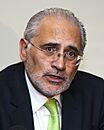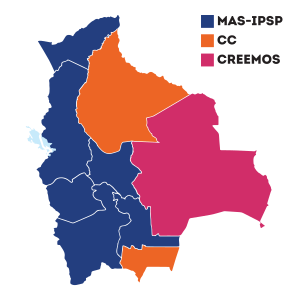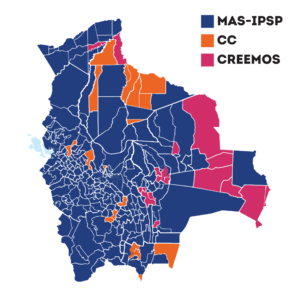2020 Bolivian general election facts for kids
Quick facts for kids |
||||||||||||||||||||||||||||||||||||||||||||||
|
||||||||||||||||||||||||||||||||||||||||||||||
| Turnout | 88.42% ( |
|||||||||||||||||||||||||||||||||||||||||||||
|---|---|---|---|---|---|---|---|---|---|---|---|---|---|---|---|---|---|---|---|---|---|---|---|---|---|---|---|---|---|---|---|---|---|---|---|---|---|---|---|---|---|---|---|---|---|---|
|
Presidential election
|
||||||||||||||||||||||||||||||||||||||||||||||
|
||||||||||||||||||||||||||||||||||||||||||||||
|
|
||||||||||||||||||||||||||||||||||||||||||||||
|
||||||||||||||||||||||||||||||||||||||||||||||
|
Legislative election
|
||||||||||||||||||||||||||||||||||||||||||||||
|
|
||||||||||||||||||||||||||||||||||||||||||||||
|
All 36 seats in the Chamber of Senators All 130 seats in the Chamber of Deputies |
||||||||||||||||||||||||||||||||||||||||||||||
This lists parties that won seats. See the complete results below.
|
||||||||||||||||||||||||||||||||||||||||||||||
On 18 October 2020, Bolivia held important general elections. People voted for a new President, Vice-President, and all members of the Senate and Chamber of Deputies. Luis Arce from the Movimiento al Socialismo (MAS-IPSP) party won the presidency by a large margin. He received 55% of the votes. His party also won most seats in both parts of the Plurinational Legislative Assembly.
These elections replaced the results from the October 2019 elections, which were cancelled because of problems. This happened during a difficult political time in Bolivia. Even though the winning party got more votes in 2020 than in 2019, they did not get a two-thirds majority in the Legislative Assembly for the first time since 2009. This meant they would need support from other parties for some decisions. Also, for the first time, more than half of the senators elected were women.
The elections were first planned for 3 May 2020. But they were delayed because of the COVID-19 pandemic. They were moved to 6 September 2020, and then to 18 October 2020. This final date was confirmed by a law on 13 August 2020, after some people protested the delays.
The main groups running in the election were the Movimiento al Socialismo (MAS-IPSP), which was in power before 2019, Civic Community (CC), and a new group called Creemos (meaning Let's create or We believe). Other parties also ran. Carlos Mesa (CC) and Chi Hyun Chung (FPV) had finished second and third in the cancelled 2019 election. Luis Arce became the MAS candidate, taking the place of former MAS president Evo Morales.
The official vote count took several days. But quick counts by polling groups showed that Arce had won enough votes to win without a second round. The temporary president, Jeanine Áñez, confirmed this soon after. Other candidates also accepted the early results. International observers from the UN, UNIORE, and OAS said there was no sign of fraud in the 2020 election.
Contents
Understanding the Election Background
The 2019 Election and Political Changes
On 10 November 2019, after many days of public protests, President Evo Morales resigned. This happened after a report from the OAS suggested there were problems with the October 2019 election. The military and police in Bolivia asked President Morales to step down. Many other high-ranking politicians also resigned, some because they worried about their families' safety. Mexico offered Morales a safe place to stay, which he accepted.
After many top officials resigned, including the Vice-President and leaders of the Senate and Chamber of Deputies, there was no one next in line to be president. Jeanine Áñez, who was the Second Vice President of the Senate, was the highest-ranking official left. She said she would become temporary president to call for new elections. On 12 November 2019, Áñez officially became the temporary head of the Senate of Bolivia. Based on this, she declared herself the temporary President of the country. A court later said her actions were legal. Some people in Bolivia protested against Áñez becoming president.
On 20 November, Evo Morales said he would not run for president again if he could return to Bolivia and finish his term. On the same day, the temporary government suggested a new law to hold new elections. This law would cancel the 20 October election and create a new election board. The law was approved on 23 November. It stopped Morales from running in the new election. In return, Áñez's government agreed to remove the military from protest areas and make other agreements to protect people.
Jeanine Áñez's Decision to Run
On 5 December 2019, Áñez said she would not run for president or support any candidate. Her minister repeated this on 15 January 2020, saying she was leading a temporary government.
However, Áñez announced her candidacy on 24 January 2020. A survey showed that while many people thought she did a good job as temporary president, most did not think she should run for president. They believed she should just call elections and not use her power to become a candidate. On 17 September 2020, Áñez ended her campaign. She did this after polls showed her in fourth place, worried that her running would split votes among other conservative candidates.
Election Delays and Protests
In March 2020, the election board announced that the election would be delayed. This was due to rules put in place to fight the COVID-19 pandemic. All major parties agreed to this delay. They also agreed that a new election date would be chosen later, based on health advice.
On 22 June 2020, Áñez approved a law that set 6 September 2020 as the new election date. The new leaders were expected to be in office by mid-to-late November 2020.
On 23 July 2020, the TSE (the election body) announced another delay. The election was moved to 18 October 2020. This was because medical reports said the pandemic would be at its worst in late August and early September. Evo Morales criticized these delays. He said they were an illegal attempt by Áñez to stay in power. Some groups, like the Bolivian Workers' Center, protested and blocked roads.
MAS supporters protested the election delays. On 3 August, they started a strike, blocking highways in some areas. Former president of Bolivia, Jaime Paz Zamora, criticized Morales for supporting the blockades. He said they caused the deaths of 33 coronavirus patients because they couldn't get oxygen. Morales later accepted the TSE's decision after more people opposed the protests. On 10 August, Morales called for talks. He asked MAS supporters to think about the TSE's plan for an 18 October election with the UN watching.
How Bolivian Elections Work
The President of Bolivia is chosen using a special system. A candidate wins if they get more than 50% of the votes. Or, they can win if they get over 40% of the votes and are at least 10 percentage points ahead of the next candidate. If no one meets these rules, the top two candidates have a second election.
The Chamber of Deputies has 130 members. Some are elected directly from local areas. Others are chosen from party lists based on how many votes the presidential candidates get. Seven seats are set aside for indigenous groups.
The Chamber of Senators has 36 members, four from each of Bolivia's nine regions. These are also chosen from party lists. The number of seats a party gets depends on the votes for their presidential candidate.
In Bolivia, voting is required for everyone over 18. Voters get a card to prove they voted. If they don't show proof, they might not be able to get their salary from the bank for three months after the election.
Before the election, the TSE said that they would not use a quick preliminary count system. Only the final official results would be published. They also said that anyone could watch the counting process and take photos of the vote records.
Presidential Candidates in 2020
By 28 January 2020, ten people had said they wanted to run for president.
On 19 January, Evo Morales announced that Luis Alberto Arce Catacora and David Choquehuanca would be the MAS party's candidates for president and vice president. This decision caused some disagreements within the MAS party. However, on 23 January, the party officially confirmed the Arce-Choquehuanca team. On 24 January, a new group called "We Believe" (Creemos) was formed. They supported the Camacho-Pumari team. By the deadline, five political groups had registered.
In July 2020, some political parties tried to stop Arce from running. They said he had shared an opinion poll too early. On 11 October, Jorge Quiroga announced he was leaving the race.
Here are the main candidates who ran:
| Party | Presidential candidate | Vice presidential candidate | |
|---|---|---|---|
| Movimiento al Socialismo (MAS-IPSP) | Luis Alberto Arce Catacora | David Choquehuanca | |
| Civic Community | Carlos Mesa | Gustavo Pedraza | |
| Creemos | Luis Fernando Camacho | Marco Pumari | |
| The Front For Victory | Chi Hyun Chung | Leopoldo Chui | |
| National Action Party of Bolivia | Feliciano Mamani | Ruth Nina | |
Candidate Debates
For 14 years, former president Evo Morales never took part in public debates with other candidates. He said he only "debates with the people." In January 2020, temporary president Jeanine Áñez tried to make debates required for presidential candidates. But the MAS-controlled Senate rejected this idea.
A big debate was announced for 6 September. It was meant to bring all presidential candidates together for the first time in almost 20 years. Over 80 media groups planned to cover it, and more than five million people were expected to watch. The event had support from many national groups and international organizations. When it aired, it had record viewing numbers.
However, the MAS candidate, Luis Arce, was not eager to attend. He and his party first set conditions for attending. Later, they said he had another interview planned. On the night of the debate, both Luis Arce and Creemos candidate Luis Camacho did not show up. Camacho said he didn't attend because he thought Mesa also wouldn't be there. Experts who watched the debate said Mesa seemed to be the strongest candidate.
While Arce did not attend the 4 October debate, he did attend another one the day before. This debate included all presidential candidates. It was organized by municipal and university groups. However, the debate format was criticized. Candidates could not respond to each other, and some accused the organizers of favoring MAS. Critics said it was more like a "monologue" or "propaganda" than a real debate. The format was partly set by Luis Arce's conditions to ensure his attendance. He required that "no personal or partisan allusions were allowed," meaning no direct criticism of other candidates or their parties.
Opinion Polls: Who Was Ahead?
Opinion polls are surveys that try to guess who people will vote for. Here's what some polls showed before the 2020 election:
First Round Polls (2020)
| Poll source | Date(s) administered |
Luis Arce |
Carlos Mesa |
Jeanine Áñez |
Luis F. Camacho |
Chi Hyun Chung |
Jorge Quiroga |
Feliciano Mamani |
María Bayá |
Would not vote |
Undecided | |
|---|---|---|---|---|---|---|---|---|---|---|---|---|
| Ciesmori [1] | 18 October (exit poll) | 52.4% | 31.5% | - | 14.1% | 1.6% | - | 0.4% | - | - | - | |
| Jubileo [2] | 18 October (exit poll) | 53.0% | 30.8% | - | 14.1% | 1.6% | - | 0.5% | - | - | - | |
| The ADN party withdrew its ballot. Bayá's candidacy was cancelled by TSE. | ||||||||||||
| Quiroga withdrew his candidacy. | ||||||||||||
| Ciesmori [3] | 29 September – 8 October | 32.4% | 24.5% | - | 10.7% | 2.4% | 1.3% | 0.4% | 0.4% | 6.1% | 13.2% | |
| 42.2% | 33.1% | - | 16.7% | 3.7% | 2.8% | 0.7% | 0.8% | |||||
| Mercados y Muestras | 20 September – 8 October | 27.1% | 27.2% | - | 14% | 2.5% | 1.6% | 0.2% | 0.3% | 7.4% | 19.8% | |
| 37.2% | 37.4% | - | 19.2% | 3.4% | 2.2% | 0.3% | 0.4% | |||||
| IPSOS [4] | 21 September – 4 October | 34% | 27.9% | - | 13.8% | 2.6% | 1.6% | 0.2% | 0.5% | - | 19.4% | |
| Ciesmori [5] | 20 September – 29 September | 30.6% | 24.7% | - | 12.7% | 2.5% | 1.5% | 0.5% | 0.3% | - | 13.3% | |
| CELAG [6] | 19 September – 29 September | 36.4% | 27.9% | - | 12.5% | 2.3% | 2.2% | - | 0.7% | 18 | - | |
| Áñez withdrew her candidacy. | ||||||||||||
| Mercados y Muestras SRL | 5 September – 11 September | 25% | 22% | 8% | 8% | 2% | 2% | 0% | 0% | 11 | 21 | |
| 37% | 33% | 12% | 12% | 3% | 3% | 1% | - | |||||
| Jubileo [7] | 3 September – 7 September | 29.2% | 19.0% | 7.7% | 10.4% | 3.2% | 2.0% | 0.4% | 0.6% | 17.7 | 9.8 | |
| 40.3% | 26.2% | 10.6% | 14.4% | 4.4% | 2.8% | 0.6% | 0.8% | |||||
| Ciesmori [8] | 26 August – 3 September 2020 | 26.2% | 17.1% | 10.4% | 6.2% | 3.3% | 2.5% | 0.6% | 1.0% | 9.3% | 22.7 | |
| 37.3% | 24.2% | 14.4% | 12.4% | 5.9% | 3.8% | 0.7% | 1.3% | |||||
| Mercados y Muestras SRL | 6–11 August 2020 | 23% | 23% | 12% | 6% | 2% | 3% | 1% | - | 11% | 19% | |
| 33% | 32% | 17% | 9% | 3% | 5% | 1% | - | |||||
| Mercados y Muestras SRL | 11–16 July 2020 | 24% | 20% | 16% | 5% | 3% | 3% | - | - | 9% | 20% | |
| CELAG [9] | 13 June – 3 July 2020 | 41.9% | 26.8% | 13.3% | 9.1% | 4.5% | 4.4% | - | - | - | - | |
| COVID-19 was declared a pandemic by the World Health Organization. | ||||||||||||
| Ciesmori [10] | 5–11 March 2020 | 33.3% | 18.3% | 16.9% | 7.1% | 3.8% | 1.7% | 1.9% | - | 6.2% | 2.8% | |
| CELAG [11] | 10 February – 4 March 2020 | 33.1% | 17.4% | 20.5% | 7.4% | 5.6% | 1.5% | 1.3% | - | 5.7% | 7.5% | |
| Miský Utaha´a [12] | 21–23 February 2020 | 29.2% | 15.3% | 13.7% | 11.1% | 8.6% | 6.7% | 0.5% | 0.1% | 11.3% | 3.5% | |
| Mercados y Muestras SRL [13] | 14–17 February 2020 | 27% | 19% | 18% | 12% | 5% | 2% | 0% | - | 7% | 9% | |
| Ciesmori [14] | 7–13 February 2020 | 31.6% | 17.1% | 16.5% | 9.6% | 5.4% | 1.6% | 1.6% | 0.5% | 7.5% | 8.7% | |
| Áñez announced her candidacy. | ||||||||||||
| Arce was announced as the candidate of MAS. | ||||||||||||
Polls Before Official Registration
| Poll source | Date(s) administered |
Luis Arce |
Carlos Mesa |
Jeanine Áñez |
Luis F. Camacho |
Chi Hyun Chung |
Jorge Quiroga |
Other | Would not vote |
Undecided |
|---|---|---|---|---|---|---|---|---|---|---|
| United States Embassy [15] | January 2020 | 37% | 9% | 9% | 11% | 4% | - | 3% | 7% | 20% |
| Mercados y Muestras SRL [16] | 9–13 January 2020 | 26% | 17% | 12% | 17% | 6% | 3% | 2% | 8% | 9% |
Second Round Polls (If Needed)
These polls showed who might win if the election went to a second round.
- Arce vs. Mesa
| Poll source | Date(s) administered |
Arce | Mesa | Would not vote |
Undecided |
|---|---|---|---|---|---|
| Muestras y Mercados | 20 September – 8 October 2020 | 32.7% | 50.3% | 7.7% | 9.2% |
| Mercados y Muestras | 5–11 September 2020 | 33% | 47% | 10% | 9% |
| Ciesmori | 26 August – 3 September 2020 | 35% | 40.1% | 11% | 13.3% |
| Mercados y Muestras | 6–11 August 2020 | 30% | 47% | 12% | 11% |
| Ciesmori | 5–11 March 2020 | 42.9% | 41% | 10.4% | 5.7% |
| Mercados y Muestras | 14–17 February 2020 | 37% | 48% | 11% | 4% |
| Ciesmori | 7–13 February 2020 | 40.8% | 40.7% | 15.2% | 3.3% |
- Arce vs. Áñez
| Poll source | Date(s) administered |
Arce | Áñez | Would not vote |
Undecided |
|---|---|---|---|---|---|
| Mercados y Muestras | 5–11 September 2020 | 37% | 38% | 17% | 8% |
| Ciesmori | 26 August – 3 September 2020 | 38.9% | 33.9% | 12.4% | 13.9% |
| Mercados y Muestras | 6–11 August 2020 | 38% | 39% | 14% | 9% |
| Ciesmori | 5–11 March 2020 | 43.2% | 42.6% | 8.3% | 6% |
| Mercados y Muestras | 14–17 February 2020 | 36% | 48% | 12% | 4% |
| Ciesmori | 7–13 February 2020 | 42.3% | 43.6% | 10.6% | 3.5% |
- Arce vs. Camacho
| Poll source | Date(s) administered |
Arce | Camacho | Would not vote |
Undecided |
|---|---|---|---|---|---|
| Ciesmori | 5–11 March 2020 | 46% | 42% | 16% | 5.9% |
| Mercados y Muestras | 14–17 February 2020 | 40% | 37% | 19% | 4% |
| Ciesmori | 7–13 February 2020 | 44.5% | 33.6% | 18% | 3.9% |
- Mesa vs. Áñez
| Poll source | Date(s) administered |
Mesa | Áñez | Would not vote |
Undecided |
|---|---|---|---|---|---|
| Ciesmori | 26 August – 3 September 2020 | 35.9% | 23.1% | 28.4% | 12.5% |
| Ciesmori | 5–11 March 2020 | 32.6% | 31.6% | 29.6% | 6.2% |
| Ciesmori | 7–13 February 2020 | 30.3% | 33.8% | 32.3% | 3.6% |
- Camacho vs. Áñez
| Poll source | Date(s) administered |
Camacho | Áñez | Would not vote |
Undecided |
|---|---|---|---|---|---|
| Ciesmori | 5–11 March 2020 | 15.6% | 41.4% | 37.0% | 6% |
| Ciesmori | 7–13 February 2020 | 16.3% | 40.8% | 38.7% | 4.2% |
How the Election Day Went
Election day was mostly peaceful. A few people tried to interfere with votes in La Paz, but they were caught.
The head of the Supreme Electoral Tribunal (TSE) praised how the elections were run. He said it was a "successful day for democracy." The United Nations also said the elections happened in an "orderly manner." The European Union congratulated Bolivia for holding safe elections.
During the vote count, the TSE received some complaints.
International Observers
Groups from other countries came to watch the elections. This included representatives from the United States Agency for International Development (USAID) and the Organization of American States (OAS). They arrived in Bolivia in January 2020 to discuss monitoring the elections.
Other international teams also observed the elections. These included the Carter Center, the Inter-American Union of Electoral Organizations (UNIORE), and the Association of Electoral Organizations of South America. The European Union sent a team of experts.
On 14 October 2020, the Progressive International sent an observer group. They were "particularly concerned about the integrity of the presidential elections in Bolivia."
A group of observers from Argentina faced some issues. One of their members was stopped at La Paz Airport. Bolivian officials said he was not allowed back in Bolivia. Other members of the Argentine group also reported being treated poorly. Argentina's president criticized these actions.
In total, 110 international observers were allowed by the TSE to watch the election. The OAS, UN, and UNIORE all said the elections were fair and found no evidence of problems. The Carter Centre also supported the results. They noted that there was a lot of false information online trying to harm the reputation of candidates and the TSE.
Election Results
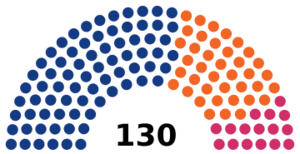 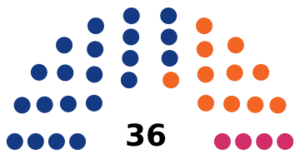 |
|||||||||
| Party | Presidential candidate | Votes | % | Seats | |||||
|---|---|---|---|---|---|---|---|---|---|
| Chamber | +/– | Senate | +/– | ||||||
| Movimiento al Socialismo | Luis Arce | 3,393,978 | 55.10 | 75 | +8 | 21 | 0 | ||
| Civic Community | Carlos Mesa | 1,775,943 | 28.83 | 39 | –11 | 11 | –3 | ||
| Creemos | Luis Fernando Camacho | 862,184 | 14.00 | 16 | New | 4 | New | ||
| Front For Victory | Chi Hyun Chung | 95,245 | 1.55 | 0 | 0 | 0 | 0 | ||
| National Action Party of Bolivia | Feliciano Mamani | 31,770 | 0.52 | 0 | 0 | 0 | 0 | ||
| Total | 6,159,120 | 100.00 | 130 | 0 | 36 | 0 | |||
| Valid votes | 6,159,120 | 94.99 | |||||||
| Invalid/blank votes | 324,773 | 5.01 | |||||||
| Total votes | 6,483,893 | 100.00 | |||||||
| Registered voters/turnout | 7,332,926 | 88.42 | |||||||
| Source: OEP | |||||||||
The election results meant that for the first time, more women were elected to the Senate than men. There were 20 women and 16 men. One of these women was Cecilia Moyoviri, the first Senator from the Trinidadian-Mojeña ethnic group. The new government officially started on 8 November 2020.
MAS improved its results compared to the cancelled 2019 elections. They won enough seats to pass laws easily in both parts of the legislature. However, they did not get the two-thirds majority they had since 2009. This means that for some important decisions, like choosing certain government officials or changing the constitution, they need support from other parties. This was the first time since 2009 that the ruling party could not make these decisions alone.
Results by Region
| Candidate | Beni | Chuquisaca | Cochabamba | La Paz | Oruro | Pando | Potosí | Santa Cruz | Tarija | ||||||||||
|---|---|---|---|---|---|---|---|---|---|---|---|---|---|---|---|---|---|---|---|
| Luis Arce | 71,957 | 34.72% | 148,452 | 49.06% | 773,386 | 65.90% | 1,162,949 | 68.36% | 186,452 | 62.94% | 25,883 | 45.80% | 211,571 | 57.61% | 576,567 | 36.21% | 124,586 | 41.62% | |
| Carlos Mesa | 81,182 | 39.17% | 139,176 | 45.99% | 371,826 | 31.68% | 486,139 | 28.58% | 97,812 | 33.02% | 14,635 | 25.89% | 131,635 | 35.85% | 275,868 | 17.32% | 150,405 | 50.24% | |
| Luis Fernando Camacho | 49,128 | 23.70% | 6,791 | 2.24% | 13,356 | 1.14% | 12,319 | 0.72% | 2,746 | 0.93% | 14,817 | 26.22% | 10,248 | 2.79% | 717,742 | 45.07% | 16,023 | 5.35% | |
| Chi Hyun Chung | 4,031 | 1.94% | 6,178 | 2.04% | 11,867 | 1.01% | 28,763 | 1.69% | 6,301 | 2.13% | 1,025 | 1.81% | 9,408 | 2.56% | 18,037 | 1.13% | 6,994 | 2.34% | |
| Feliciano Mamani | 963 | 0.46% | 1,996 | 0.66% | 3,216 | 0.27% | 11,032 | 0.65% | 2,940 | 0.99% | 157 | 0.28% | 4,364 | 1.19% | 4,137 | 0.26% | 1,342 | 0.45% | |
| Invalid/blank votes | 23,818 | 10.31% | 19,230 | 5.98% | 40,895 | 3.37% | 71,441 | 4.03% | 13,733 | 4.43% | 3,262 | 5.45% | 31,685 | 7.94% | 90,734 | 5.39% | 22,259 | 6.92% | |
| Total votes | 231,079 | 321,823 | 1,214,546 | 1,772,643 | 309,984 | 59,779 | 398,911 | 1,886,387 | 321,609 | ||||||||||
| Registered voters/turnout | 270,213 | 85.52% | 368,623 | 87.30% | 1,340,548 | 90.60% | 1,923,305 | 92.17% | 339,950 | 91.19% | 72,136 | 82.87% | 453,287 | 88.00% | 1,683,085 | 89.22% | 376,846 | 85.34% | |
Reactions to the Results
Even though the official results took a few days, quick counts showed that Arce won in the first round. The vote counting was open to the public, and people could take photos of the tally sheets. President Áñez and former president Tuto Quiroga, who were opponents of MAS, congratulated Luis Arce. Evo Morales celebrated in Argentina.
Luis Almagro, the head of the OAS, also congratulated Luis Arce and David Choquehuanca. He said that democracy would help Bolivia have a bright future. Carlos Mesa, another candidate, accepted Arce's win and said he would lead the opposition. On 23 October, after the final count, Luis Camacho also publicly accepted the results.
Many political allies of Evo Morales, including leaders from Nicaragua, Mexico, Brazil, Ecuador, Venezuela, and Argentina, congratulated Arce and Choquehuanca. The United States Secretary of State, Mike Pompeo, also congratulated Arce. He hoped that the US and Bolivia could work together. Arce said he was open to working with the US again after nine years of broken relations. He also wanted to restart diplomatic ties with Venezuela and Cuba.
Bolivian newspapers called Arce's victory "clear and crushing." They praised his calm statements after winning. They also noted that the new president would need to manage different groups within his own party. Some experts said Arce won because of strong support in rural areas. They also pointed to the weakness of Mesa's campaign and how Camacho's candidacy split votes among anti-MAS voters.
What Happened After the Election
On 25 October, some groups in Santa Cruz claimed there was fraud and that Luis Arce was not the real president-elect. These groups, who supported Luis Fernando Camacho, called for strikes across the country.
To make up for not having a two-thirds majority, MAS lawmakers made changes to the rules of the legislature. These changes meant that some decisions that used to need a two-thirds vote could now pass with a simple majority. Some opposition lawmakers left the session in protest. Opposition leader Carlos Mesa criticized these changes, calling them "authoritarian." However, MAS Senator Omar Aguilar said the changes would "speed up the legislative task."
President-elect Arce supported the changes. He said they would help the new government get things done. He also said that many laws would still need a two-thirds vote, so people shouldn't worry.
On 5 November, Luis Arce's campaign house in La Paz was attacked. On 14 November, a lawyer who claimed election fraud was arrested. Arce officially became president on 8 November 2020.
In June 2021, a news organization reported that they had found recordings of officials from the previous government and the military planning another attempt to take power. The plans involved using people from the United States.
The Election's Lasting Impact
On 1 February 2021, Luis Arce's government declared 18 October 2020 as the "Day of recovery of intercultural democracy." Before this, 10 October 1982 was seen as the day Bolivia returned to democracy. That was when the military gave power back to the elected president. This new decree asks government ministries and other groups to organize activities to celebrate democratic values. Carlos Mesa criticized this move. He called it an "insult" to the citizens who fought for democracy on 10 October 1982.
See also
 In Spanish: Elecciones generales de Bolivia de 2020 para niños
In Spanish: Elecciones generales de Bolivia de 2020 para niños
 | Laphonza Butler |
 | Daisy Bates |
 | Elizabeth Piper Ensley |



